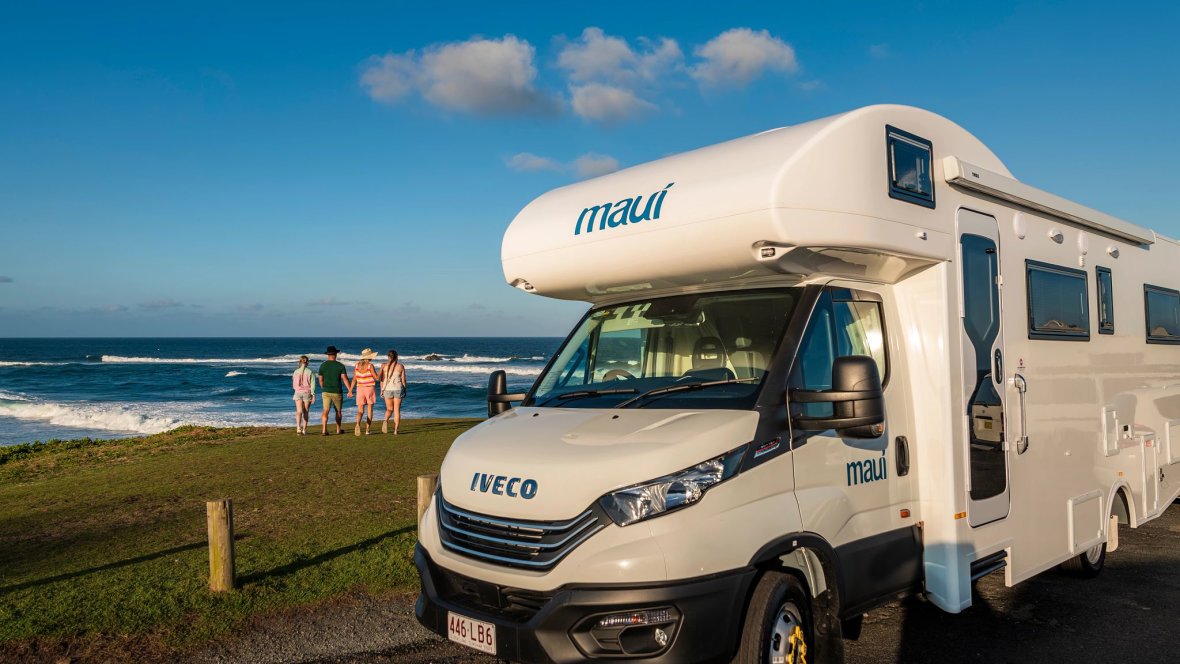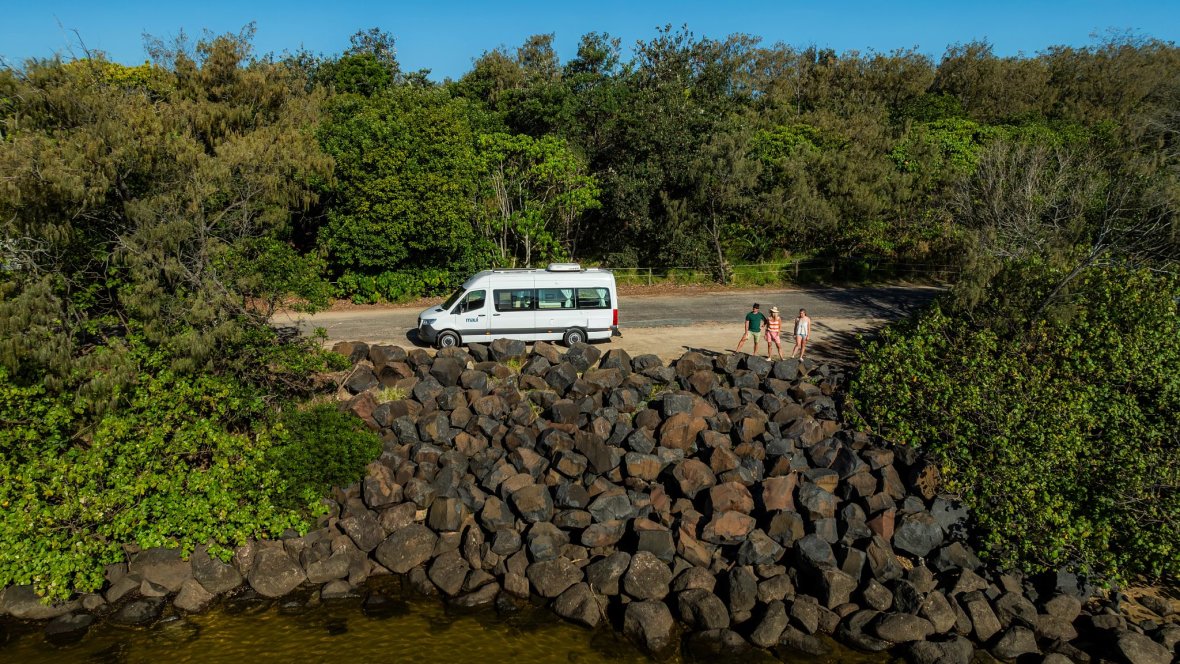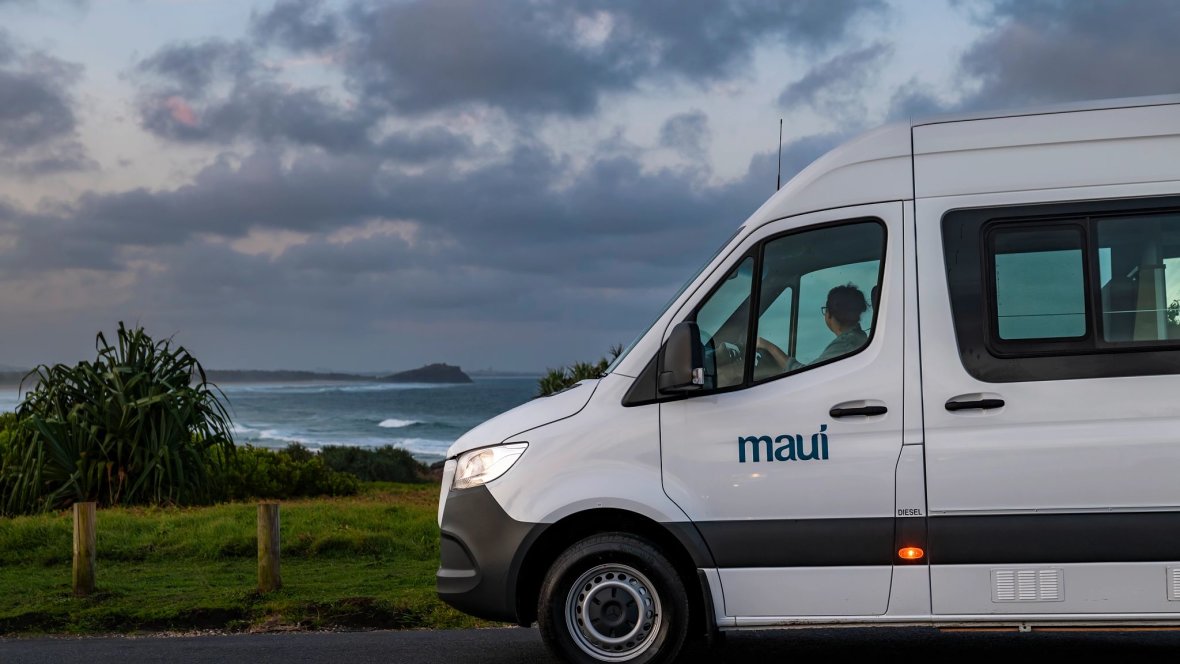General rules for campervan and motorhome parking in Australia
When it comes to exploring Australia, few options offer the flexibility and freedom of a maui camper. With your bed, kitchen, and transport all rolled into one, you can wake up to the sunrise over the beach one day and fall asleep under the stars in the Outback the next. However, where you can park overnight at each of these locations will depend on a number of factors:
Public vs. private land
In Australia, campervan parking regulations vary depending on whether you’re on public or private land. Parking on public land, such as rest stops and national parks, is often allowed, but there are often rules to follow. In contrast, private property requires explicit permission from the landowner. Always check signage and local council rules, as some areas may prohibit overnight parking altogether.
Free camping, designated camping areas, and overnight parking
Free camping is a popular option for budget-conscious travellers who want to park overnight in their campervan. Designated free camping areas and campervan parking areas generally provide basic amenities like toilets or picnic tables and can be located anywhere from scenic reserves to the side of the highway rest stops.
Pro Tip: Apps like the thl Roadtrip App, WikiCamps, and CamperMate can help you locate camper-friendly parking spots and provide reviews from other travellers. If your camper is self-contained (equipped with a toilet, water supply, and waste storage), you’ll have more flexibility in choosing overnight spots.
Local council restrictions and signage
Additionally, every council in Australia implements its own regulations concerning overnight campervan parking. It is essential to observe signage, particularly in urban and tourist-focused regions where parking rules are rigorously enforced. Familiarising yourself with parking signs, like the green 'P' that signifies allowed parking times, is vital, as overlooking these can lead to parking fines.
Campervan overnight parking options
Okay, but where exactly can you park overnight in your motorhome in Australia? Well, you have several options. From well-equipped caravan parks to the serene beauty of national parks and the convenience of rest areas, here are a few of our top picks to keep in mind when looking for a place to park your campervan overnight in Australia.

Caravan parks and holiday parks
Caravan parks are a popular choice for many campervan and motorhome travellers looking to park overnight, offering a range of amenities that can make your stay more comfortable. These parks typically provide power hookups, clean restrooms, hot showers, laundry rooms, and sometimes even swimming pools and playgrounds. They are widely available across Australia, from bustling urban areas to remote countryside locations.
Staying at a caravan park can also provide a sense of security, as these parks are often well-lit and monitored. They cater to different budgets, with options ranging from basic sites to more luxurious spots with additional amenities. Whether you’re looking for a place to recharge your batteries (literally and figuratively) or a family-friendly environment, caravan parks are a reliable option.
Plus, as it’s recommended to plug your motorhome into a powered site every second night, caravan parks are a great way to keep the house battery charged to power essentials like the fridge, water pump, and lights. Additionally, some features, such as the microwave, power outlets, and air conditioning, require mains power to function properly. If you intend to use these features regularly, you will want to keep this in mind when planning where to park.
National parks
For those seeking a more immersive experience in nature, staying overnight in one of Australia’s national parks can be incredibly rewarding. National parks offer designated camping areas where you can wake up to the sounds of wildlife and enjoy stunning natural landscapes. However, it’s important to note that camping in national parks often requires a permit, and you must adhere to specific rules to protect the environment.
These parks usually provide basic amenities such as toilets and picnic tables, but facilities can vary widely. Always check the specific park’s guidelines and book your spot in advance, especially during peak seasons.
Rest areas & free campgrounds
Rest areas are a convenient option for short overnight stays, especially when you’re on the move and need a quick place to park your campervan. Located along highways and major roads, rest areas provide basic amenities such as toilets, picnic tables, and sometimes even BBQ facilities. These spots are ideal for a brief stop to rest and refresh before continuing your journey.
While rest areas are generally free to use, they often have time limits, typically allowing stays of up to 24 hours and may have minimal amenities. It’s essential to follow these rules to avoid fines and ensure these facilities remain available for all travellers.
A state-by-state guide to campervan and motorhome parking
Australia’s sheer size means that states tend to operate quite independently of one another when it comes to campervan parking laws and regulations. Whether you’re travelling along coastal highways, venturing into rugged national parks, or exploring bustling cityscapes, understanding state-specific parking rules and the legally permitted areas is essential for a seamless road trip.

Victoria
Victoria is a fantastic state for campervan road trips, offering everything from coastal drives along the Great Ocean Road to alpine adventures in the High Country. Here is a little snapshot of what to expect when parking in a campervan overnight in Victoria:
-
Rules for parking overnight in Victoria: Victoria has a number of designated free camping sites listed on their website. These areas are ideal for budget-conscious travellers and offer basic amenities. Rest stops along highways are also available for short stays, but these are usually limited to 24 hours. Camping in national parks requires a permit, and overnight parking in urban areas like Melbourne is prohibited unless at designated caravan parks or campgrounds.
-
Tips for finding legal and safe parking spots: The Great Ocean Road and Yarra Valley are iconic stops, so the free camping options here are very limited. We recommend booking spots in advance, as these areas can be crowded even during off-peak seasons.
-
Popular destinations: The Twelve Apostles, Wilsons Promontory National Park, and Phillip Island are must-visit destinations with nearby camper-friendly accommodations.
New South Wales
New South Wales (NSW) is one of Australia's most visited states, offering diverse landscapes from stunning beaches to rugged mountains. For a hassle-free campervan road trip, it’s important to familiarise yourself with the local rules:
-
Rules for parking overnight in NSW: NSW has numerous rest areas along its highways for short stays, as well as free camping spots. That said, overnight parking in Sydney and surrounding urban areas is heavily regulated, so you will need to use caravan parks or campgrounds for longer stays in these regions-especially near the beach. Iconic parks like the Blue Mountains and Kosciuszko National Park require permits for camping. Overnight parking is allowed only in designated areas.
-
Popular destinations: Bondi Beach, Byron Bay, the Hunter Valley wine region, and the Blue Mountains are top attractions in NSW that are worth visiting on a campervan road trip.
South Australia
South Australia offers a mix of natural beauty and cultural heritage, from wine regions to rugged coastlines. Of all the mainland states, SA has quite a friendly camping culture. However, there are still a few things to keep in mind:
-
Rules for parking overnight in SA: Urban parking near Adelaide is limited to caravan parks, but RV-friendly towns in the region provide accessible and affordable parking options. Similarly, areas like the Barossa Valley and Clare Valley have free camping options near wineries. These often require self-contained vehicles and adherence to local rules.
-
Tips for finding legal and safe parking spots: South Australia is known for its RV-friendly towns, such as Port Augusta and Goolwa, which provide dump points and water refills. Roadside rest areas are also plentiful for short stays. As these are located in more remote regions, always be sure to park near well-lit areas for additional safety.
-
Popular destinations: The Flinders Ranges, Kangaroo Island, and Coorong National Park are highlights, with nearby camper-friendly sites. For more details, check South Australia’s caravan and camping guide.
Northern Territory
The Northern Territory (NT) is a wild and rugged destination that’s perfect for adventurous campervan road trips. From exploring iconic landmarks like Uluru to navigating the wetlands of Kakadu, the NT offers an unmatched Outback experience. However, parking rules here are unique due to the region's remoteness and cultural significance:
-
Rules for parking overnight in the NT: As you can imagine, there are plenty of wide-open spaces in the NT! While this does mean you will find plenty of stunning Outback camps, there are a few caveats. First, parking in the world-famous parks located in the NT, like Uluru and Kata-Tjuta, is limited to designated areas. Both parks have well-maintained campgrounds with facilities, so it’s best to plan ahead and book in advance during peak seasons. Second, it is important to be aware of local council restrictions, particularly around towns like Darwin and Alice Springs, where overnight parking outside of designated areas is prohibited.
-
Special considerations for remote areas and Indigenous land: Much of the NT is remote, and certain areas are sacred Indigenous land where camping or even entry requires special permission. Always respect cultural restrictions and stick to authorized routes and campsites. The Northern Territory's camping guide is a great resource for planning.
-
Tips for finding legal and safe parking spots: Safety is crucial in the NT’s remote regions. If you’re free camping, choose well-lit and secure locations, and always let someone know your travel plans. Carry plenty of water, fuel, and food, as services can be sparse.
-
Popular destinations and camper-friendly areas: Popular camper-friendly spots include Katherine Gorge, where you’ll find excellent camping facilities, and Litchfield National Park, which offers scenic campsites by waterfalls. Plus, towns like Alice Springs and Darwin have caravan parks equipped with all the amenities you’ll need.
Western Australia
Western Australia (WA) is a camper’s dream, with its stunning Coral Coast in the north, famous Margaret River wine region in the south, and rugged Outback landscapes in every other direction. Whether you're chasing sunsets on the beach or exploring remote national parks, WA offers plenty of options for campervan parking—but it pays to know the rules:
-
Rules for parking overnight in WA: WA has some incredible free camping sites, particularly along the Coral Coast and in the Margaret River region. While many of these spots offer basic amenities, they still often require that campers are fully self-contained to protect the environment.
Perth and Fremantle enforce strict rules around overnight parking in public spaces. Day parking is usually fine in designated areas, but for overnight stays, head to one of the many caravan parks or campgrounds in the area.
-
Tips for finding legal and safe parking spots: Like most Aussie states with plenty of Outback to spare, many of the remote WA towns are very RV-friendly and may even offer facilities like dump points and water refills!
-
Popular destinations and camper-friendly areas: The Ningaloo Coast is a must-visit, with its stunning marine life and camper-friendly sites located both within the national park and just a short drive from the park. The Margaret River region also caters well to motorhome travellers, with plenty of wineries and breweries offering parking options for visitors. Both areas offer a mix of free and paid camping options.
Australian Capital Territory (ACT)
The Australian Capital Territory (ACT) may be small, but it offers unique camping and parking opportunities, especially in and around Canberra. Whether you’re exploring national attractions or enjoying nature reserves, understanding the rules is key. Learn more about camping options at ACT Parks.
-
Rules for parking overnight in ACT: Overnight parking in residential streets is generally not permitted throughout the ACT. As such, travellers should use designated campgrounds or caravan parks when travelling in these regions. Some nature reserves offer camping facilities, but it's essential to check for any permit requirements or restrictions.
-
Tips for finding legal and safe parking spots: When in doubt, consult the local tourist information centres for guidance on approved camping areas.
-
Popular destinations and camper-friendly areas: While the ACT is relatively small, areas like Tidbinbilla Nature Reserve and Namadgi National Park offer camping opportunities for those looking to explore the region's natural beauty.
Queensland
Queensland’s sunshine, beaches, and rainforests make it a top choice for campervan hire. With plenty of free camping options and caravan parks in Queensland, the state is well-equipped for road trippers.
"Can you sleep in a caravan on the side of the road in Queensland?”
Queensland is legally the strictest regarding local parking laws. Unlike many of the other Australian states, it is legally prohibited to sleep in your car for any reason outside of designated camping and parking spots in QLD. However, this doesn't mean you don't have plenty of choices when it comes to free camping, rest areas and holiday parks:
-
Rules for parking overnight in QLD: Free camping is available in designated areas; however, it’s crucial to adhere to local council regulations to avoid fines. Urban areas like Brisbane and Cairns have limited free camping options. It’s advisable to use designated caravan parks or campgrounds for overnight stays.
-
Restrictions in national parks like Daintree and Lamington: Camping in national parks requires permits, and it’s essential to use designated camping areas to protect the environment.
-
Popular destinations and camper-friendly areas: Whether you're looking to explore the Great Barrier Reef Drive, dive into the Atherton Tablelands, venture into the Undara Lava Tubes or hit up the Gold Coast theme parks, there is no shortage of beautiful landscapes to explore in QLD.

Tasmania
Tasmania is a compact yet diverse island state, perfect for a campervan road trip. Whether you’re exploring Hobart’s urban attractions or the remote wilderness of Freycinet National Park, understanding parking rules will enhance your experience.
-
Rules for parking overnight in Tasmania: Tasmania has an unparalleled free camping scene. To access these, you will likely need to be self-contained. The caveat? Free camping is generally not permitted within city limits. Luckily, there is no shortage of great holiday parks in Tasmania!
-
Seasonal considerations: Tasmania experiences four distinct seasons, and weather conditions can change rapidly. Always check local council guidelines and weather forecasts before planning your trip.
-
Tips for finding legal and safe parking spots: Resources like Free Camping Tasmania provide comprehensive information on available sites. Always ensure you are camping in designated areas to protect the environment and avoid fines.
-
Popular destinations and camper-friendly areas: Tassie is known for its nature: the Bay of Fires, Mount Field National Park, and Freycinet National Park are must-visits.
Pro Tip: While this section highlights the key regulations, restrictions, and tips for parking your campervan or motorhome around Australia, we recommend that you check each relevant state website before your road trip to confirm the most up-to-date information.
Final tips for beginner motorhome users
Taking your first motorhome road trip in Australia is an adventure like no other. Here are a few last practical tips to help you get the most out of your trip:
Planning ahead: A bit of prep can save you a lot of hassle on the road. Apps like the thl Road Trip App, WikiCamps, and CamperMate are fantastic tools for finding camping spots, free parking areas, and nearby attractions. They’re easy to use and packed with reviews from other travellers, so you’ll always know what to expect.
Stay respectful: Following local rules and being considerate is the golden rule of motorhome travel. Stick to designated parking spots and motorhome sites, check signage for restrictions, and always leave your site as you found it—or better. Not only will this save you the headache of a parking ticket, but it will ensure the continuation of these sites for years to come.
Safety first: Safety should always be on your mind, especially if you’re planning to free camp. Choose well-lit, secure areas for overnight stops and trust your instincts. If something feels off, don’t hesitate to move on to another location.
Join communities: Motorhome travel is as much about the people you meet as the places you go. Joining online forums or connecting with fellow travellers at campgrounds is a great way to swap tips, learn about hidden gems, and share a story or two.
Ready to explore?
Ready to hit the road? You can easily book your maui motorhome online and pick it up from one of our many maui branch locations to start your adventure today!



